Text

wild and fluorescent come home to my heart
0 notes
Text
Thinking abt Stavrogin and how his confession only serves to lead people to a version of himself he wants them to believe: a sinner who could not escape his crime and driven to death by subconscious guilt, losing a bet with god. It is "a chronicle of events" he chooses to tell abt himself, but to tell a story is most oftenly to evade showing it.
dosto eventually did away with the idea of his confession, realizing how it failed to enter the realm of truth and closure, but presented itself as the last, biggest lie, Stavrogin's last ironic experiment. He tells a lot of lies to make people think they have made their own judgement about him, that they know him and what role he would play; now he had one specifically reserved for the readers. For us.
0 notes
Text



stavrovensky childhood meeting
#I'M SO IN LOVE WITH UR ART OP I SCREAMEDDDD#LOOK AT THEM LOOK AT THEM#I LOVE THEM BITING SCREAMING CRYING
37 notes
·
View notes
Text
Very specific brand of American stavrovensky that exist in exactly two fics that occupies my heart like nothing does
0 notes
Text
I think it's rarely recognized and maybe very ooc/mostly fanon, but Pyotr is self-destructive when it comes to his relationship with Stavrogin in addition to being destructive in general. Which is fascinating, bc Pyotr is animalistically attached to life. Death is off the table for him. But I don't question that he would let himself be demolished to save the name of Stavrogin (he said something along this line in the book, it could be his exaggerated speech, but I really think he genuinely would do that). Above all he's a daydreamer and an aesthete, who values the myth of the form above everything else. He's trying in part to release Stavrogin and himself both from content - from the resistance to deception - from this madness of truth, as opposed to their own laughable sanity.
They are intricately linked to each other's death drive, to infertility and the failure of creation. That's what makes their relationship desperate and distraught; it was an endless cycle of waiting for the other shoe to drop, and mourning. It's either sirens or silence with these two, two cases of tinnitus housing the suspension of death.
This narrative is woven by the purest, heaviest elements: innocence, beauty, freedom. Their link is too fragile, too weak, too light; both too proud to touch the ground. Too absorbed in themselves to counter the inertia of light with dreamless sleep. Insomniacs immortalized. Forever awake, forever alert. Strength and action.
The unconscious takes over by slowly veiling the external world with fantastical motives. a fairytale of nothingness. Self-destruction with no purpose simply marks the first symptom of this nothingness-tale beginning to seep in.
#stavrovensky#the possessed#very very mentally ill abt these two i can't think it through i need to know#things need to be thought and said and explained to me my brain is in draught
1 note
·
View note
Text
reading that stavrovensky fic at 4 am again and crying and shaking why is the author so talented i wish for my life i could write smth like this but also like why is it just perfection why is my ship so perfectly twisted like
It hurts me it reaches into me and grabs my heart and squeeze it bleeds it dry and my soul is haunted by all the poetry
My darling nihilistic little ship perfect companion to lana del rey song collection the most fucked up ever the most romantic
0 notes
Text
Ok but I’ll never understand why so many ppl portray Jack as the head over heels pining mess and Ralph as the one who doesn’t care and just rolls his eyes like HUHHH
Ralph was throughout the entire book fond of Jack, the idea of Jack hating him genuinely shocked him and made him upset (and Jack was already pretty off the rails at that point). When Jack left the group Ralph was so distraught, trying to convince himself Jack would come back eventually. Even at the very end he still wanted to save him (and everyone else).
Ralph admires Jack, he likes him and enjoys his company, making it hurt more when Jack starts hating him. (like that “why do you hate me?” line)
They both wanted the others approval, but it was Jack who towards the end started to see Ralph as just an obstacle for full control. Which is why it surprises me that so many people think of Ralph as being the one who is indifferent and dismissive
51 notes
·
View notes
Text
Not me yassifying stavrovensky again
When ur stabbing your idol your sun the only thing genuine about you the only one with whom u don't have a mask on or DO YOU >>>

#art commission but i drew part of this 😋#stavrovensky#demons dostoevsky#i just like making them funny little twinks from 70s bl sorry
1 note
·
View note
Text
stavrovensky soul nourished again thank u for @ing me @4listr




Pyotr’s so pathetic 😭
576 notes
·
View notes
Text


didi forget to post my gayass au petenka design drawinfs here i think sorry u have to look at him now


23 notes
·
View notes
Text
When their entire relationship is toxic, but they're both so fucked up that it's actually the best case scenario, because subjecting anybody else to either of them would be a human rights violation.
46K notes
·
View notes
Text
Banger take from the fyolai queen i love the last part so much it shook me to my core but also
SPEAKING OF FREEDOM

[This is a segment from "Who is Stavrogin: An aesthetic interpretation (as a part of a Kierkegaardian reading of 'The Possessed' by F. Dostoevsky)" by Stefan Iliev. ]
I just love how the open end of Pyotr's narrative returns to freedom here; if you think about it (and I quote the BBC radio drama here), Pyotr's whole idea about the revolution could also translate to his desire of being "the only spontaneous person in an obedient world". He wants to be the only one with free will in a world of slaves, to put it simply. Which kinda circles back to bsd Nikolai. They both turn into "the tragedy of freedom" when they are left without the object of their religious fervor/affection/need to be understood.
What I think is interesting here is that Stavrogin/Fyodor are not god, but made god by this one enthusiast of free will. They are more like the absurdity of the universe which does not discriminate between good and evil, and in their path destroys and devours others' life and mind. That makes them post-Nietszchean figures, not necessarily man-gods (in Stavrogin's case, since he rejects everything, even recognizing the futility of his strength), but are imbued with the will to power nevertheless. What connects them, I think, is a terrible intellect and the tendency to calculate every decision and base their actions on intellect and reason only. Irl dosto makes arguments about this often.
Pyotr is also argued by some to be a Gogolian character and by amazing chance (since I don't think he thinks as deeply as the fandom 🙄) Asagiri has made bsd Nikolai a jester/clown
All of this is kinda reaching but op has done a brilliant job connecting these two ships and it got me thinking really hard!! kudos to Creantzy🥰
Defying God - a parallel between Fyolai and Stavrovensky
The Demons brainrot is taking over, and you know what happens when I acquire a new interest: my brain WILL find a way to connect it to my other interests, whether I like it or not!! And this is essentially what it's about xD I've come here to present a parallel I found between Fyolai (Fyodor & Nikolai from BSD) and Stavrovensky (Verkhovensky & Stavrogin from "Demons" by Dostoevsky). Before I start I want to clarify a few things:
• I don't think these two pairings are similar, I just love picking up any crumbs of connections I can find between my interests, even if it'd count as reaching.
• This interpretation (in either character's case) is in no way "the only true way of looking at it". It's merely one interpretation out of many and I chose to focus on just a few aspects out of the many others there are to explore in these complex characters.
• Feel free to add onto or disagree with anything I say! I'm interested in your thoughts :D
WARNING: There will be spoilers for Bungou Stray Dogs and Demons.
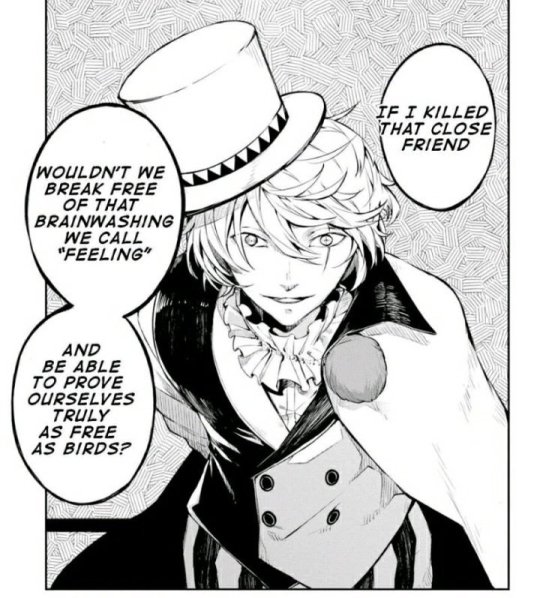
The reason Nikolai wants to kill Fyodor is because he feels affection for him. Emotions are a prison to him, and he basically seeks the opposite of what his emotions make him want to do. Thus, in the face of affection, which makes you want to be closer and wish the best for your friend, he does the opposite and decides to kill said friend, going directly against his feelings in an attempt to prove free will. But here I want to focus more on the "You want to defy God in order to lose sight of yourself" part, specifically the bit about God.
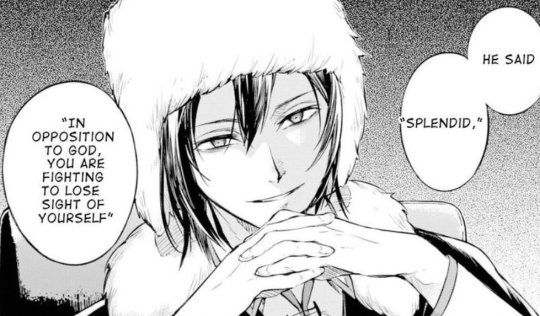
One part of my interpretation is that Nikolai associates God with control. If there is a God who controls all, how can there be a free will? He wants to go against Him and His creations (the human mind, morality, etc.) to prove that it's possible. But God is very abstract - the idea of God is influential but varies depending on cultures, etc. For this point, I'll use the example of the biblical God, or, more specifically, some attributes commonly assigned to the idea of God:
• omnipotence (all-powerful)
• omnipresence (all-present)
• omniscience (all-knowing)
What I am leading up to is the fact that these traits can, in one way or another, be applied to Fyodor. Fyodor's character represents everything Nikolai wants to defy. Nikolai hates control; he wants to fight the idea of God and prove the possibility of complete independence. Fyodor (though not in a "direct" way) could be seen as a symbol for God. He knows everything, he is always present (metaphorically and sometimes literally, the way he spawns sometimes I swear-), and he seems to control everything. Only few people actually see him, but he pulls the strings behind the scenes, and his power is felt everywhere. For Nikolai, to kill Fyodor is not just a protest against his feelings of affection, but can also be a symbolic act of defying "God", of killing "God", by killing Fyodor.
This is supposed to be very symbolic and not taken literally. I feel the need to repeat this because I personally dislike the notion of Fyodor as a literal God (and disagree with the idea of him having a God-complex), so this is merely about the God-like traits he possesses, like a "substitute" for the idea of God, and how it interacts with Nikolai's philosophy. (I've also exaggerated some points for the sake of simplification - for example, I don't actually believe Fyodor is in control of absolutely everything, etc.)
Moving onto Demons:
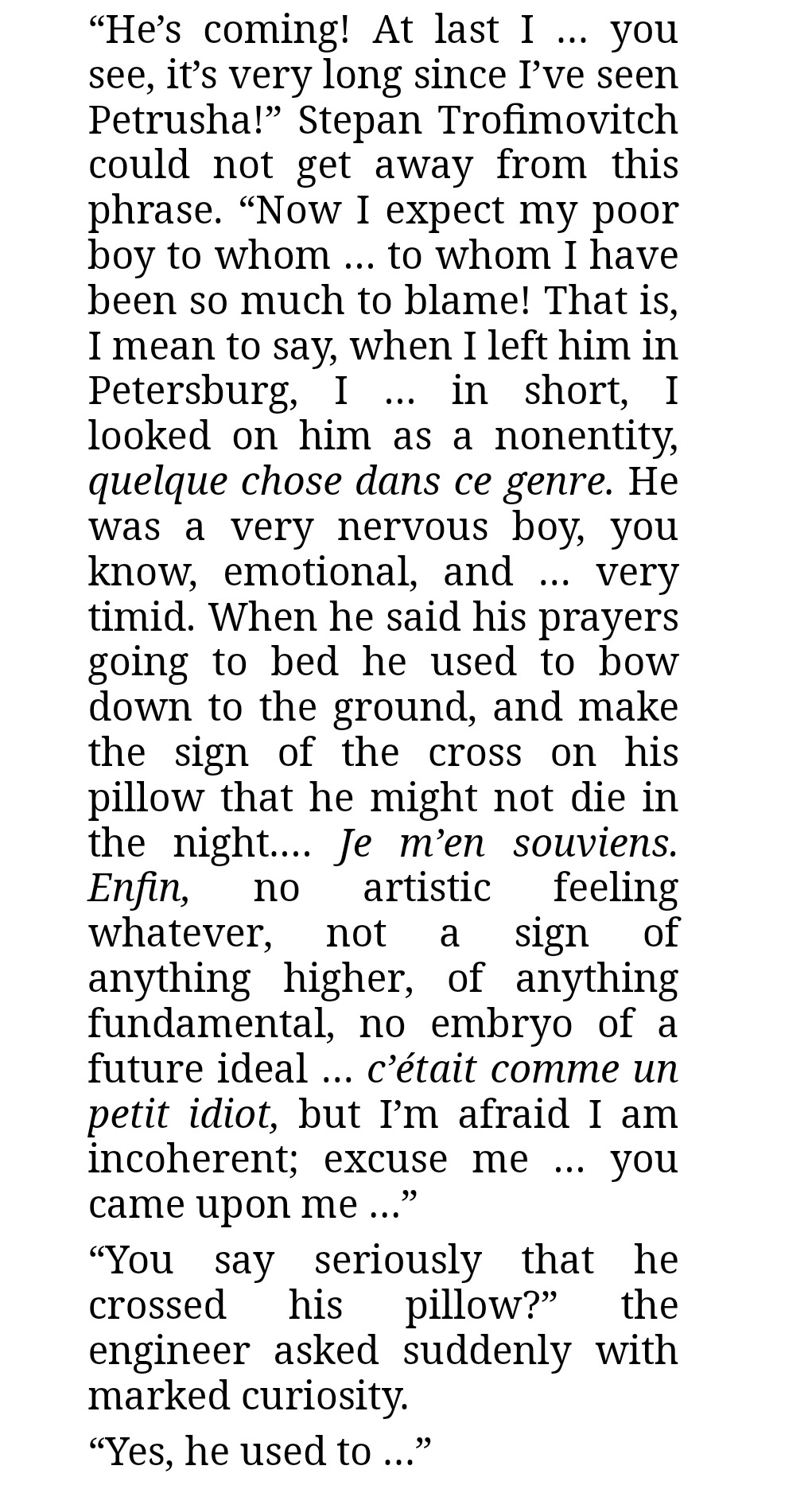
Pyotr Verkhovensky grew up religious and (assuming based on Stepan's description) with a fear of God.
Now he's an atheist and very anti-religious. He plans to overthrow society, and destroying religion + everything it preaches is part of that plan. But interestingly enough, he picks not himself as the official future "ruler", but someone else: Nikolai Stavrogin. He chooses Stavrogin to be the role of the leader in Verkhovensky's ideal society. But not exactly the "leader" in the traditional sense, because he wouldn't necessarily give Stavrogin all the power. He would simply use him as a "pawn" (for lack of a better word) while himself pulling the strings behind said society. With that, Verkhovensky puts someone else above himself, in a God-like position, but he wants to do it while still keeping full control over Stavrogin. By doing so, he would overcome his childhood fear of God because instead of being controlled by God, *he* will control God.
(Same case here, not the literal God, but the character who he assigns God-like traits to.)
I am undecided (with both Nikolai's and Verkhovensky's character) whether this could be read as a solely subconscious intention or if it would make sense as a conscious one as well. Given that both have a different "main" goal (Nikolai focuses on emotions and Verkhovensky on the revolution) I lean more towards thinking it's subconscious (if present at all - like I said, just interpretations!)
It doesn't help that Verkhovensky describes his vision of Stavrogin's leadership as "hidden": Everyone believes in him and his power, but only very few people are said to actually have laid their eyes upon him. When I first read this part, I was honestly reminded of Big Brother from Orwell's 1984, but eventually realised that similar things can be said about God as well.
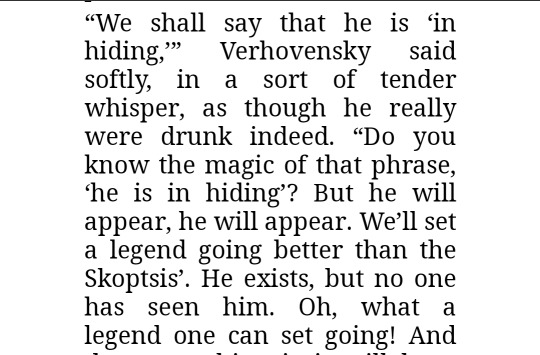
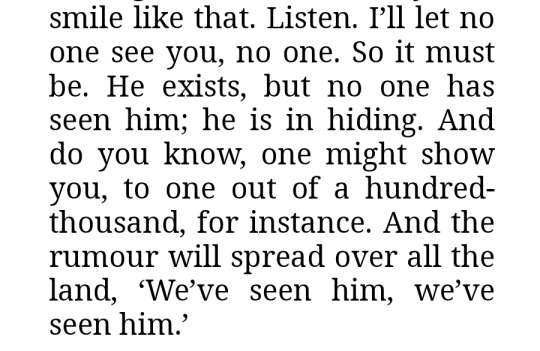

While these are parallels, they don't come without differences. Nikolai needs Fyodor dead, Verkhovensky needs Stavrogin alive. Nikolai wants to kill Fyodor for a sense of freedom, Verkhovensky wants to keep Stavrogin for a sense of control. Yet both symbolic goals are bound to fail:
Fyodor turns out to be unkillable, and Stavrogin ends up dead.
At the end, "God" stays untouchable.
333 notes
·
View notes
Note
WERE U ALWAYS AN ARTIST??? I don’t remember seeing ur drawings before but they’re so good
omg I'm sorry i didn't make this clear, i commissioned those arts! (and i don't want to type "this is commissioned art" everytime so i put it in the tags
That being said I'm happy you like them ☺️🥰 i love my ship and want people to see my blorbos sooo bad
1 note
·
View note
Text
convinced by this one paper that stavrogin is meant to be gay but also i feel like he's not into humanity in general he's just pyotr(who embodies nihilism)-sexual...for example he said to shatov he can't love him i mean if you think about it he's only ever a void and interested in the fact that he's a void and he doesn't gaf abt god or freedom or man-god or love - any theme embodied by other characters
#I'm stavrovensky delulu#the 'ive tested my strength everywhere' line#i think the important part is 'everywhere' and not 'tests strength'#i still hold that the core of his character is how he wanders the earth finding nowhere to belong#he's metaphysically displaced first and foremost and it doesn't matter what he experiments with#he could sleep on a different bed everywhere and lament that no bed makes him feel comfortable ever
2 notes
·
View notes
Text

them as meme
7 notes
·
View notes
Text

What's up i came bearing new stavrovensky art (commissioned by my friend)
The idea for the color palette is from Lovecraft's The Colour Out of Space. I've always thought that Nikolai's whole character concept is kinda Cthulhu and I link stavrovensky to Cosmicism.
23 notes
·
View notes
